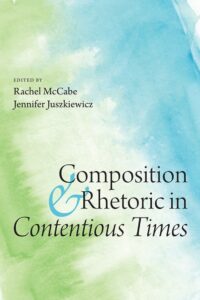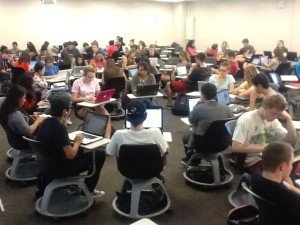Resources for CSU, Chico’s “jumbo” first-year composition course.
Link to course site: English 130P
 Excited to be part of a new edited collection from Drs. McCabe and Juszkiewicz with my dear friend and colleague Laura Sparks. Chapter 6: “On Non-scalability and Transformative Relationships in the First-Year Composition ‘Jumbo.’”
Excited to be part of a new edited collection from Drs. McCabe and Juszkiewicz with my dear friend and colleague Laura Sparks. Chapter 6: “On Non-scalability and Transformative Relationships in the First-Year Composition ‘Jumbo.’”
Excerpt:
This chapter first offers a brief overview of the Jumbo design, then takes up Anna Tsing’s work on “nonscalability” to make the case for the Jumbo model’s generative potential in first-year writing. In particular, we conceptualize the Jumbo in terms of growth, rather than expansion, arguing that it operates outside the logic of scalability. We further advocate for an imaginative, active, not reactionary, approach to course development. As Tsing so aptly puts it, “conceptualizing the world and making the world are wrapped up with each other—at least for those with the privilege to turn their dreams into action. The relationship goes both ways: new projects inspire new ways to think, which also inspire new projects.” We contend that the large-enrollment Jumbo offers powerful possibilities for creating and sustaining vibrant, action-oriented communities—new projects for all of us.
TOC and sample chapter: link here

Link to recent article: “Epic Learning in a ‘Jumbo’ Writing Course”
Thank you to the editors of this special issue of Composition Studies–Drs. Dawn Shepherd, Samantha Sturman, and Heidi Estrem–for a wonderful issue focused on corequisite writing courses. Bonus: working with my colleagues Laura Sparks and Chris Fosen to share the jumbo writing course. Many people have asked about the jumbo course design; grateful to be able to point folks to this issue.
Epic Learning: Ignite Talk
Goals for Redesign
- Develop Practices for Responding to Writing for Future Teachers—a central component to this redesign was an emphasis on development of future teachers and TAs by providing experience in working with student writing. Interns, who work as mentors in the course, collaborate with faculty in responding to student work. We meet weekly as a team to discuss student writing and writing pedagogy.
- Focused Professional Development for Faculty—this course allows faculty to rethink the role of the writing instructor and the use of technology in writing pedagogy.
- Develop Assessment Practices and Research Agenda in the Academic Writing Program—another major component of this redesign was to develop undergraduate, graduate, and faculty opportunities for research in the program that could be shared with the campus, and more broadly, the field of writing studies.
- Proactively Address the Raise in Caps—in this configuration, faculty can take a proactive stance towards the raise in caps for English 130. In this jumbo model, the instructor is not as central to revision work. The course follows a “community of practice” (Wenger) model by creating small learning communities, embedding mentor support, and developing 130 students into capable peer responders to writing.
 “Epic Learning: Large Class as Intentional Design” article for DMLCentral.
“Epic Learning: Large Class as Intentional Design” article for DMLCentral.
Reich, Justin. “Making Writing Classes Larger and Other Heresies of Connected Courses.” EdTech Researcher. Nov 2016.
“Epic Composition” talk given by Kim Jaxon & Tom Fox at CCCC in Houston, TX, April 2016.
“Not Your Grandmother’s Comp Class.” Chris Fosen and I discuss the jumbo design with Tom Fox on NWP radio.
Participation structures and roles.
Slides from talk given at American Association of State Colleges and Universities.
The Chronicle of Higher Education article about our course: “Bigger Classes Encourage Experiments in Teaching”
